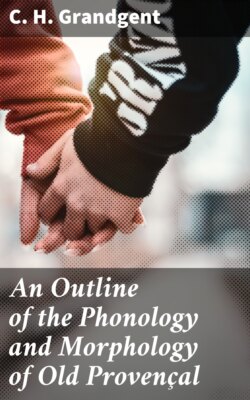Читать книгу An Outline of the Phonology and Morphology of Old Provençal - C. H. Grandgent - Страница 9
На сайте Литреса книга снята с продажи.
II. PHONOLOGY.
ОглавлениеTable of Contents
14. Inasmuch as Provençal, like the other Romance languages, grew out of the Latin commonly spoken under the Roman Empire, we must take this latter language as our starting-point. The transformation was so gradual and continuous that we cannot assign any date at which speech ceases to be Latin and begins to be Provençal; since, however, the various Latin dialects—destined to become later the various Romance languages—began to diverge widely in the 6th and 7th centuries, we may, for the sake of convenience, say that the Latin period ends at about this time. Before this, certain changes (which affected all the Romance tongues) had occurred in the popular language, differentiating it considerably from the classic Latin of the Augustan writers. Although the most important of these alterations have to do with inflections rather than with pronunciation, the sound-changes in Vulgar Latin are by no means insignificant.
15. It is essential at the outset to distinguish “popular” from “learned” words. The former, having always been a part of the spoken vocabulary, have been subject to the operation of all the phonetic laws that have governed the development of the language. The latter class, consisting of words borrowed by clerks, at various periods, from Latin books and from the Latin of the Church, is naturally exempt from sound-changes that occurred in the vulgar tongue before the time of their adoption. The form of learned words depends, in the first place, on the clerical pronunciation of Latin at the date of their borrowing; then, if they came into general use, their form was subject to the influence of any phonetic laws that were subsequently in force. The fate of borrowed terms differs, therefore, according to the time of their introduction and the degree of popularity which they afterwards attained.
